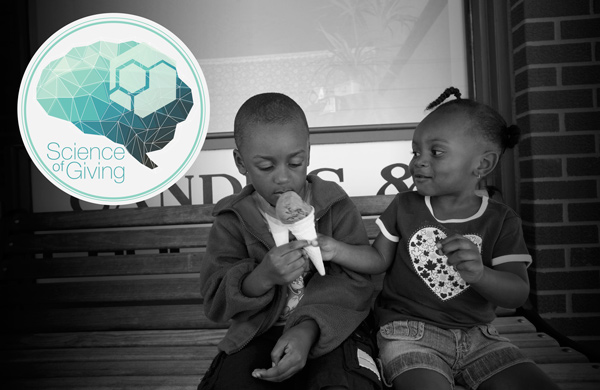The Secret to Raising a Generous Child | Science of Giving Series #4
A recent article from The Atlantic makes a startling claim: according to a new Harvard University study, The Children We Mean to Raise, only 20% of children believe that their parents value caring for others as a top priority. This is in sharp contrast to what parents claim is important for their children to learn: 96% of parents say they want to raise ethical, caring children. The other 80% of children surveyed reported that their parents were more concerned about achievement or happiness. Writes Jessica Lahey in The Atlantic, this study “reveals that the message parents mean to send children about the value of empathy is being drowned out by the message we actually send: that we value achievement and happiness above all else.” While you may not be surprised to hear that other people’s children don’t value caring for others as a top priority, this study indicates that your own children may well be part of this overwhelming majority.
“[This should be a] wake-up call to parents,” says child psychologist and author Michele Borba. “We need to reprioritize our parenting agendas ASAP. The science reveals the irony of the situation: happier and more successful kids care about others, they are able to relate, be concerned, and respect differences, and a lack of empathy makes kids less successful, and less happy.”
This dilemma, which authors of The Children We Mean to Raise dub the rhetoric/reality gap, presents parents with an unforeseen challenge. Yes, we want our children to be kind, compassionate, and generous human beings. We probably even talk to them about the importance of these qualities. But how can we ensure these messages aren’t being drowned out by a louder, more persistent focus on achievement, happiness, and other forms of personal success?
An innate desire to share
Focusing on generosity may be the perfect place to start. From a holistic perspective, generosity in children means more than simply sharing a toy with a friend or sibling. When we think about raising generous kids, what we’re hoping for is that they will thrive in all sorts of relationships by being willing to give and share. We want them to learn to appreciate making a positive contribution to their community and develop a healthy sense of self that recognizes their individual capacity to create change as well as their fundamental connectedness to the world around them.
From an early age, children demonstrate an incredible capacity to behave generously. Even without parental encouragement, young toddlers will spontaneously assist a stranger or share their much-loved treats. Studies on this seemingly innate motivation to be generous challenge the prevailing belief that children must be taught how to give. Indeed, not only do children seem to instinctively understand how and why they should be generous, studies indicate that they find this helping behavior to be intrinsically rewarding. Being generous just makes kids happier.
A foundation for personal success
Prosocial behavior—behaviors intended to help other people, such as empathy, altruism and generosity—appears to directly connect to a number of factors important for our children’s personal success. Early demonstrations of prosocial behavior help boost later academic achievement, as well as contribute to stronger peer relationships. Children who give are happier, physically healthier, and more socially connected than their less generous counterparts. In short, The Children We Mean to Raise study claims we are focusing too much on the importance of achievement and happiness, rather than helping our children actually achieve such personal success by focusing instead on generosity.
Getting results
With this new understanding about the intrinsic nature of generosity, the burden has shifted for parents. Rather than preaching about the moral and ethical reasons for being generous, we can focus instead on providing our children with the guidance and tools they need to build on what they already know. The secret to raising generous children simply lies in consistently building on their innate capacity to give.
Here are a few suggestions for putting this into practice at home:
- Keep generosity at the forefront of conversations. “Did you finish your homework?” and “How did you do on that test?” are questions we ask our kids on a regular basis, placing an unintentional emphasis on the value of achievement. Consider adding some new questions to your after-school conversations, such as “What was the kindest thing you saw someone do today?”
- Turn giving into a family project. Picking charitable or volunteer projects to do together helps solidify generosity as a family value. Try spending one evening a month doing something generous as a family, such as spending time at a food bank or picking up trash in your neighborhood.
- Ask questions that spark critical thinking and creativity. In The Children We Mean to Raise, study authors recommend that parents help children “zoom in” on issues affecting their close community, and “zoom out” on issues affecting the wider world. Discussing these issues (appropriately) with children helps develop empathy by practicing taking the perspectives of those affected, and gets the creative juices flowing about how to make a difference. Rather than telling your child that your elderly neighbor’s wife passed away and that you’ll be sending over a casserole, engage your child in a discussion about the situation. “Here’s what happened… what do you think we could do to help?”
- Create a new tradition. Turn an existing tradition such as birthdays or holidays into an opportunity to practice generosity by including a charity gift card in your Christmas stockings or collecting donations of canned food along with birthday presents. Alternatively, try creating a new “holiday” by picking a date to be your annual Family Giving Day, and plan on using that day to give back each year.
- Celebrate positive steps. Experts recommend against rewarding prosocial behavior, but finding other ways to celebrate acts of kindness or generosity can help reinforce your child’s intrinsic motivations to give. Telling your child how much you appreciate their contribution when they do extra chores or sharing stories about each other’s generous moments will help children feel valued, and further weave the importance of generosity into the fabric of your family.

Helping our children establish a strong, well-rounded value system is something we all hope to achieve as parents. However, the daily worries about grades, friendships, schedules, and other day-to-day details of parenting can sometimes color the overall message we send to our kids; we tend to talk most about what worries us most. Simply redirecting the focus of our daily conversations and family activities can completely change our children’s perception of what we value most. Focusing on generosity over personal achievement will not only help them succeed more in the long run, but they’ll be happier, more connected, and more deeply fulfilled along the way.
Read the earlier posts in the Science of Giving series:

